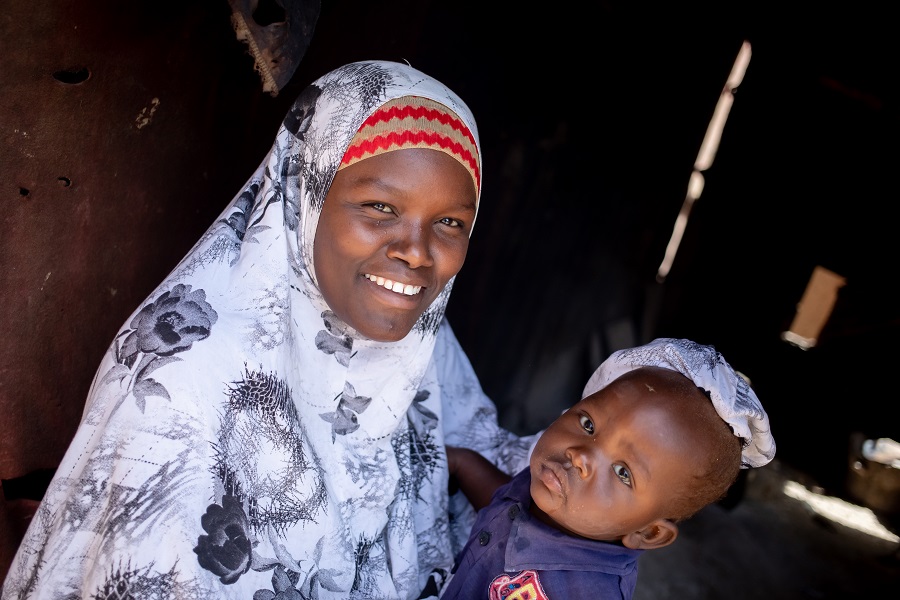 Mother and child wait to receive a vaccination at a camp for internally displaced persons in Mogadishu, Somalia. Credit: Ismail Taxta/ WHO.
Mother and child wait to receive a vaccination at a camp for internally displaced persons in Mogadishu, Somalia. Credit: Ismail Taxta/ WHO.
Mogadishu, 20 March 2023 – Since 2013, the 20 March has been commemorated as the International Day of Happiness. The day provides an occasion to recognize and reflect on the importance of happiness in the lives of people around the world. Numerous studies show correlation between mental health, happiness and quality of life and yet, mental health is often neglected in health programming, particularly in fragile contexts like Somalia. Yet, it is in these contexts that mental health and psychosocial support (MHPSS) is particularly needed.
Having faced decades of conflict, displacement, climate shocks and extreme poverty, the incidence of mental health issues in Somalia is thought to be one of the highest, if not the highest, among low-income countries. With limited access to support services, populations in need of MHPSS and their families are likely to be caught up in a cycle of poverty, mental illness, social marginalization, stigma and general health issues, reducing both quality of life and life expectancy.
WHO is working with the Ministry of Health to expand access to MHPSS services, which is a crucial component of the Somalia Essential Package of Health Services (EPHS, 2020), and to promote coordination between actors through the Mental Health technical working group. In partnership with the International Organization for Migration (IOM), the United Nations Children’s Fund (UNICEF) and the Ministry of Health, WHO also implemented the “Improving psychosocial support and mental health care for conflict-affected youth in Somalia: a socially inclusive integrated approach for peacebuilding” project with funding from the United Nations Peacebuilding Fund.
The project sought to establish links between mental health care and peacebuilding and contribute to building better social cohesion amongst communities by reducing harmful mental health impacts and negative coping behaviors including substance abuse. Research conducted by WHO in three districts as part of this project found that three quarters of participants in clinical and non-clinical settings were experiencing some sort of mental health issue while the prevalence of substance abuse issues and poor quality of life were also high. The research also found that there has been a positive relationship between those suffering from mental illness with substance abuse, meaning that those suffering from mental illness often resort to substance abuse as part of their coping mechanism. With a particular focus on young people, who make up three quarters of Somalia’s population and are well-positioned to contribute to the country’s transition from conflict to lasting peace, the project worked to strengthen institutional and community support for MHPSS for conflict-affect youth, while reducing stigma associated with mental health issues.
The project found that while improving mental health care services is essential to enabling young Somalis to contribute to their communities and actively engage in peacebuilding, it is not sufficient. Without access to employment and livelihoods opportunities and a sense of hope for the future, young people struggled to escape the pervasive cycle of mental heath and substance abuse issues.
Reflecting on the impact of the project on the International Day of Happiness, WHO Representative to Somalia and Head of Mission, Dr Mamunur Rahman Malik called for a holistic, multi-sectoral response, saying, “mental health and psychosocial support is essential to enabling people around the world to live happy and healthy lives. We know that health is a holistic state of well-being, not merely the absence of disease. While expanding access to mental health services as part of Somalia’s Essential Package of Health Services, we must link with other projects and initiatives to break the cycle of poverty, stigma and exclusion and ensure that those experiencing mental health issues have access to education, to livelihoods, to opportunities to engage with their communities and build a sense of hope for the future.”
----------------
For additional information, please contact:
Kyle DeFreitas
WHO Somalia External Relations Lead
Fouzia Bano
WHO Somalia Communications Officer
Chief of Staff ai,
-----------------
Related links
For further information on WHO’s work on mental health, including in Somalia, please see:
World Mental Health Day 2021, Somalia: WHO EMRO | Making mental health care for all a reality in Somalia: United Nations and the Government join forces to scale up quality mental health services at all levels of care | News | Somalia site
Mental Health at WHO: Mental health (who.int)


